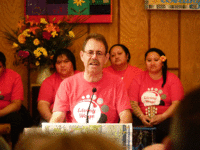News
Shane Olsen
2 October 2012
 New Zealand has one of the worst rates of income inequality of the developed or wealthy countries in the Organisation for Economic Cooperation and Development (OECD).
New Zealand has one of the worst rates of income inequality of the developed or wealthy countries in the Organisation for Economic Cooperation and Development (OECD).
In two decades the country has gone from being one of the most equal to among the most unequal countries in the developed world.
As the gap between the rich and poor in New Zealand grows amid rising food and housing costs, more New Zealanders fail to earn enough to meet their needs.
The Living Wage Aotearoa New Zealand campaign was launched on August 30 with the goal of achieving a living wage as a necessary step to reduce inequality and poverty in society.
A living wage is defined as an income which allows workers and their families to not only survive but to participate effectively in society. The campaign has grown out of the concerns of unions, churches and community groups about the effects of low wages on families, workers and society.
The idea of a living wage has a long history in Catholic Social Teaching. Widely regarded as the first modern papal social teaching document, Pope Leo XIII’s encyclical Rerum Novarum (1891), focused on the importance of a just wage to support workers and their families. This was at a time when the industrial revolution in Europe had been built on the low wages and poor conditions of workers.
A just wage was the true test of any economic system, Pope John Paul II said 90 years later in Laborens Exercens (1981).
Today there is clear evidence that the economic system is not measuring up well with more than 270,000 children in New Zealand living below the poverty line and the top fifth of the population earning five times as much as the bottom 20 percent.
Currently 100,000 New Zealand workers earn the minimum wage ($13.50 an hour) and 36 percent of all waged workers earn less than $18.00 per hour.
An increasing body of evidence suggests that if all workers can earn enough to support their needs and those of their families, the health of low-income families and the wellbeing of society in general will improve.
The Justice, Peace and Development (JPD) Commission of the Wellington Archdiocese supports the aim of the Living Wage campaign because of the evidence that many working people are still living in poverty. Having a job does not guarantee freedom from financial hardship. Boosting the incomes of low-waged workers is highly likely to benefit many New Zealand families. The rest of society benefits when every family can support their own needs. This includes everyone being able to provide their families with healthy food and a suitable home.
We need to ask ourselves what each of us can do. Does your organisation or company offer a living wage to all employees? How can I encourage a higher minimum wage to support the community and, in particular, low-income families?
Shane Olsen chairs the archdiocesan Justice, Peace and Development Commission, an active supporter of the Living Wage campaign.
Image: John Ryall of the Service and Food Workers’ Union addressing the Living Wage Campaign launch in Wesley Church, Wellington, on August 30.
Photo: Derek Johnson